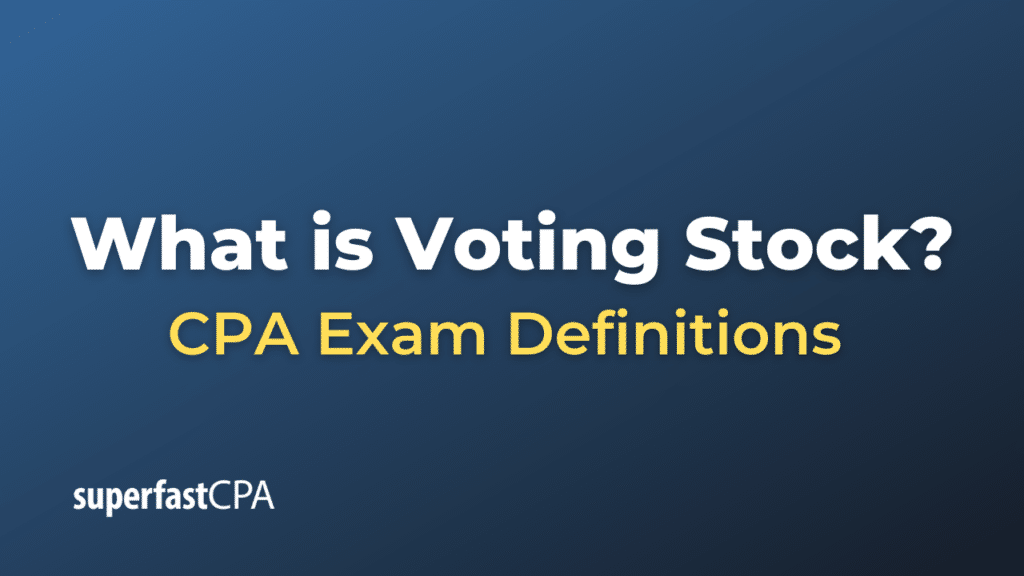Voting Stock
Voting stock refers to shares in a company that grant the shareholder the right to vote on corporate matters, such as the election of directors, mergers and acquisitions, and changes to the corporate charter or bylaws. These shares allow investors to have a say in the company’s governance, in proportion to their ownership stake. Typically, each share of voting stock is entitled to one vote, although some companies have multiple classes of stock with different voting rights attached to each class.
Types of Voting Stock
- Common Stock: Most common shares come with voting rights. These are the most typical form of voting stock and are what people generally refer to when they talk about buying “shares” in a company.
- Preferred Stock: Preferred shares generally do not carry voting rights, but in some cases, they may have conditional voting rights. For example, preferred stockholders might gain voting rights if the company misses certain dividend payments.
- Class A, Class B, etc.: Some companies have different classes of common stock with different voting rights. For example, Class A shares might confer one vote per share, while Class B shares might confer 10 votes per share. This structure is often used by family-run businesses or tech companies to maintain control while still raising capital.
- Non-voting Shares : Some companies issue non-voting common shares, which do not confer any voting rights but may otherwise be similar to voting shares in terms of dividends and capital appreciation.
Importance of Voting Stock
- Corporate Governance: Voting stock allows shareholders to influence the direction of the company by voting for directors and significant corporate actions.
- Accountability: Voting rights enable shareholders to hold the management and board of directors accountable for their actions.
- Value: Generally, voting shares are considered more valuable than non-voting shares because they come with the added benefit of influence over corporate decisions.
- Investor Activism : Ownership of a significant portion of the voting stock can allow investors to push for changes in the company, such as strategic shifts or management shake-ups.
Example of Voting Stock
Let’s consider a fictional example to illustrate how voting stock works in a company.
Company Details:
- Company Name: GreenTech Innovations
- Industry: Renewable Energy
- Total Outstanding Shares: 1,000,000 Common Shares
- Ownership: You own 10,000 shares of GreenTech Innovations’ common stock, which is 1% of the company.
Scenario 1: Board of Directors Election
GreenTech Innovations has 7 board seats up for election this year. As a shareholder, you get to vote for each seat. You have 10,000 shares, so you have 10,000 votes for each board seat. You cast your votes in favor of candidates who align with your views on sustainability and corporate responsibility.
Outcome 1:
The candidates you voted for win the majority of votes and become board members. As a result, the board now has a stronger focus on sustainable technologies and practices, aligning with your investment philosophy.
Scenario 2: Proposed Merger
The board proposes a merger with another company called SolarTech. Shareholders are asked to vote on whether to approve the merger.
- Options: YES to approve the merger, NO to reject it, or ABSTAIN.
Your Role:
Your 10,000 shares mean you have 10,000 votes. After doing your research and considering the implications, you believe the merger would be beneficial for GreenTech Innovations and would increase shareholder value. You cast all 10,000 of your votes in favor of the merger.
Outcome 2:
The merger proposal receives votes from shareholders representing 600,000 shares in favor, 350,000 shares against, and 50,000 abstained. The merger is approved with a majority of the votes.
Importance:
Your votes played a role in both electing a board of directors that aligns with your values and in approving a merger that you believe will add value to your investment.
In Summary:
Owning voting stock in GreenTech Innovations allowed you to participate in crucial decisions affecting the company’s direction and potentially your investment’s value. Whether it’s electing the board of directors or voting on significant corporate actions like a merger, your ownership stake gives you a voice in the company’s governance.













